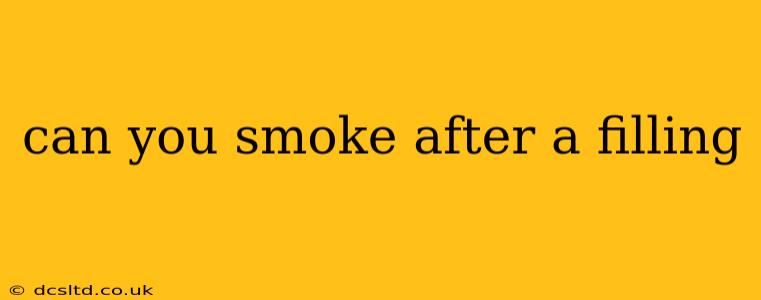Can You Smoke After a Filling? The Risks and Recovery Process
Getting a dental filling is a common procedure, but recovering properly is crucial for preventing complications and ensuring the longevity of your restoration. One common question patients have is whether they can smoke after a filling. The short answer is: no, you shouldn't smoke after a filling, at least not immediately. Smoking significantly hinders the healing process and can lead to serious problems.
This article explores the reasons why smoking is detrimental after a dental filling, providing detailed information to help you make informed decisions about your oral health.
Why Shouldn't You Smoke After a Filling?
Smoking negatively impacts your oral health in several ways, and these effects are amplified after a dental procedure like getting a filling. Here's why you should avoid smoking:
-
Impaired Healing: Nicotine constricts blood vessels, reducing blood flow to the affected area. This reduced blood flow hinders the healing process, making it harder for the filling to bond properly with the tooth and increasing the risk of infection or complications. Proper blood flow is essential for delivering the necessary nutrients and cells for tissue repair.
-
Increased Infection Risk: Smoking weakens your immune system, making you more susceptible to infections. A compromised immune system after a filling procedure could lead to serious complications, including infections around the filling site, which may require further treatment.
-
Dry Socket Risk: For extractions (which may precede some fillings), smoking significantly increases the risk of developing a dry socket. A dry socket is a painful condition where the blood clot protecting the extraction site dislodges, exposing the underlying bone. This is even more likely if you're a smoker. While not directly related to fillings themselves, many procedures involve some level of preparation that might impact this.
-
Delayed Healing and Longer Recovery Time: The combined effects of reduced blood flow and a weakened immune system mean that your recovery time will likely be prolonged if you smoke. This means discomfort and potential complications may last longer.
-
Decreased Filling Longevity: Smoking can damage the newly placed filling and shorten its lifespan. The harmful chemicals in cigarette smoke can weaken the bonding between the filling material and your tooth, making it more prone to damage and requiring replacement sooner than expected.
What Happens if I Smoke After a Filling?
Smoking immediately after a filling increases the risk of the following complications:
-
Infection: As mentioned, reduced blood flow and weakened immunity make infection much more probable. This can manifest as pain, swelling, and pus around the filling.
-
Dislodged Filling: The pressure changes from smoking can potentially dislodge a newly placed filling, requiring another visit to the dentist.
-
Increased Sensitivity: Smoking can irritate the already sensitive area surrounding the filling, causing increased pain and discomfort.
How Long Should I Wait Before Smoking After a Filling?
Ideally, you should avoid smoking for at least 24 hours after a filling, and ideally much longer. The longer you abstain from smoking, the better your chances of a successful and complication-free recovery.
Can I Smoke After a Temporary Filling?
The same rules apply to temporary fillings. Avoid smoking as it can dislodge the temporary filling, making it necessary to schedule an additional appointment for repair or replacement. Temporary fillings aren't as strong or long-lasting as permanent ones.
What Are the Alternatives to Smoking During Recovery?
Consider nicotine replacement therapy (NRT) such as patches or gum to help manage withdrawal symptoms during your recovery period. Speak with your doctor or dentist to find the best strategy for you. Quitting smoking entirely is the best way to protect your oral health and overall well-being in the long run.
In conclusion, while the urge to smoke may be strong, it's crucial to prioritize your oral health and avoid smoking immediately after a dental filling to minimize risks and ensure a swift and complication-free recovery. Consult your dentist for personalized advice.
